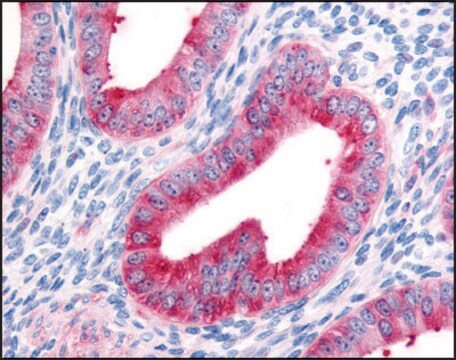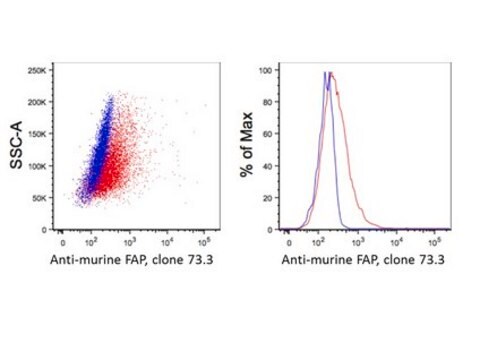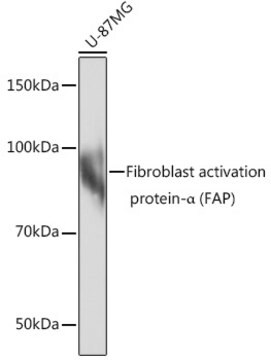ABT11
Anti-Fibroblast activation protein alpha (FAP) Antibody
from rabbit
Synonym(s):
fibroblast activation protein, alpha, fibroblast activation protein, alpha subunit, integral membrane serine protease, seprase, 170 kDa melanoma membrane-bound gelatinase, FAP
About This Item
Recommended Products
biological source
rabbit
Quality Level
antibody form
saturated ammonium sulfate (SAS) precipitated
antibody product type
primary antibodies
clone
polyclonal
species reactivity
human
technique(s)
immunohistochemistry: suitable
western blot: suitable
isotype
IgG
NCBI accession no.
UniProt accession no.
shipped in
wet ice
target post-translational modification
unmodified
Gene Information
human ... FAP(2191)
General description
Specificity
Immunogen
Application
Inhibition: Inhibition of dipeptidyl peptidase activity with a previous lot of FAP antibody on HT-29 xenograft tumors was demonstrated by an independent laboratory (Cheng, 2002).
Cell Structure
Apoptosis & Cancer
ECM Proteins
Tumor Markers
Quality
Western Blot Analysis: 2.5 µg/mL of this antibody detected FAP in 10 µg of HEK-FAP xenograft tumor lysate.
Target description
Physical form
Storage and Stability
Analysis Note
HEK-FAP xenograft tumor lysate
Other Notes
Disclaimer
Not finding the right product?
Try our Product Selector Tool.
Storage Class Code
10 - Combustible liquids
WGK
WGK 1
Regulatory Listings
Regulatory Listings are mainly provided for chemical products. Only limited information can be provided here for non-chemical products. No entry means none of the components are listed. It is the user’s obligation to ensure the safe and legal use of the product.
JAN Code
ABT11:
Certificates of Analysis (COA)
Search for Certificates of Analysis (COA) by entering the products Lot/Batch Number. Lot and Batch Numbers can be found on a product’s label following the words ‘Lot’ or ‘Batch’.
Already Own This Product?
Find documentation for the products that you have recently purchased in the Document Library.
Our team of scientists has experience in all areas of research including Life Science, Material Science, Chemical Synthesis, Chromatography, Analytical and many others.
Contact Technical Service








